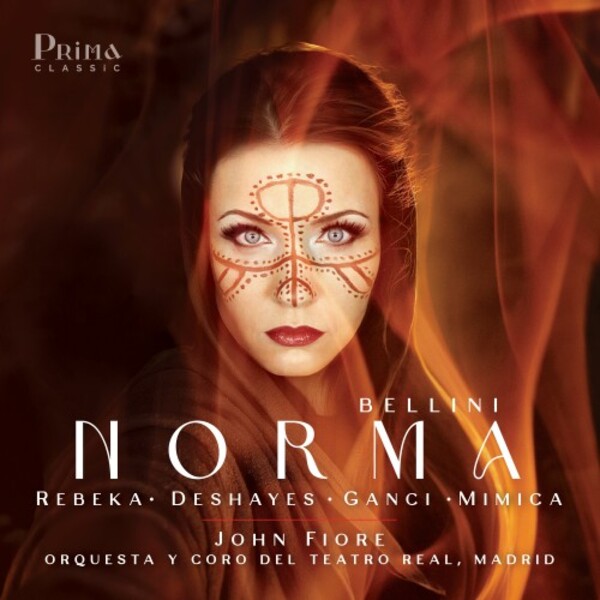BELLINI Norma (Fiore)
View record and artist detailsRecord and Artist Details
Genre:
Opera
Label: Prima Classic
Magazine Review Date: 01/2025
Media Format: CD or Download
Media Runtime: 158
Mastering:
DDD
Catalogue Number: PRIMA022

Tracks:
| Composition | Artist Credit |
|---|---|
| Norma |
Vincenzo Bellini, Composer
Anta Jankovska, Clotilde, Soprano Gustavo De Gennaro, Flavio, Tenor John Fiore, Conductor Karine Deshayes, Adalgisa, Mezzo soprano Luciano Ganci, Pollione, Tenor Madrid Teatro Real Chorus Madrid Teatro Real Orchestra Marina Rebeka, Norma, Soprano Marko Mimica, Oroveso, Bass |
Author: Tim Ashley
Released by Marina Rebeka’s own label Prima Classic, this is the first studio recording of Norma to appear in over a decade, and considerable thought and care have clearly gone into it. Made in Madrid in 2022, it uses impeccable orchestral and choral forces from the Teatro Real. Unlike the Traviata (5/20) from the same label, the production values are high and the accompanying material is extensive and scholarly. It also gives us a new critical edition by Roger Parker based on Bellini’s autograph and early editions of the vocal score, and some of the emendations are significant. ‘Casta diva’ in G rather than F and the quiet alternative ending to the ‘Guerra’ chorus are familiar from previous recordings. More surprising are a third strophe to the cabaletta of the ‘Oh! Rimembranza’ duet, and the opening of a substantial cut in the ‘Oh! Di qual sei tu vittima’ trio in the Act 1 finale. The duet now strikes me as too long, though you may think differently.
For all that, however, it arouses mixed feelings. Rebeka is up to the vocal challenges of the title-role, though she lacks a perfect trill (anyone familiar with Callas, Sutherland or Sills as Norma will know the difference it can make). The voice is sumptuous and majestic, the top thrilling and admirably secure. ‘Casta diva’ sounds comfortable in the higher key, and Rebeka gives us a spectacular sustained top B at the melody’s apex in the da capo, where most singers either break the note in two or revert to the syncopated repetitions of the earlier verse. Against all that, however, must be set a certain generalisation in her characterisation, a seeming unwillingness to go to emotional extremes. Recitatives don’t always bite as they could or should. The great phrases like ‘È troppo tormentoso, troppo orrendo è un tal dubbio’ sometimes fail to lay bare Norma’s agony of mind.
She is not helped by what surrounds her. Luciano Ganci can be an indifferent Pollione, his tone at times uningratiating, his coloratura ungainly. Again the characterisation is generalised: we have little sense here of a man racked by desire, guilt and unreason. Marko Mimica’s Oroveso also gets off to an awkward start with some cloudy tone in ‘Ite sull’ colle’ but settles by the time he reaches ‘Ah! del Tebro’, which impresses. Karine Deshayes’s Adalgisa, in contrast, is remarkable. A high mezzo, rather than the soprano Bellini envisaged, she also has the title-role in her repertory, and there is never any question of effort at the top. Her tone is creamy, nicely contrasting with Rebeka’s greater metal, and every word and line is etched with wonderfully expressive subtlety. It’s an outstanding performance.
Conductor John Fiore also leaves much to be desired. You can’t fault the playing and choral singing, but there is a lack of cumulative dramatic momentum. Opening the big cut in the Act 1 finale may afford insight into Bellini’s original intentions but the passage needs much greater forward propulsion than Fiore gives it. ‘In mia man alfin tu sei’, the astonishing confrontation at the work’s climax, is curiously understated, its endlessly shifting string figurations never quite trawling the protagonists’ souls as they should. It’s a set in which the disparate elements never really cohere into a satisfactory whole. Rebeka’s many admirers will find much to enjoy, and Deshayes makes hearing it well worth your while. But as an interpretation of one of the supreme tragic statements in opera, it sadly falls, all too frequently, wide of its mark.
Discover the world's largest classical music catalogue with Presto Music.

Gramophone Digital Club
- Digital Edition
- Digital Archive
- Reviews Database
- Full website access
From £8.75 / month
Subscribe
Gramophone Full Club
- Print Edition
- Digital Edition
- Digital Archive
- Reviews Database
- Full website access
From £11.00 / month
Subscribe
If you are a library, university or other organisation that would be interested in an institutional subscription to Gramophone please click here for further information.




